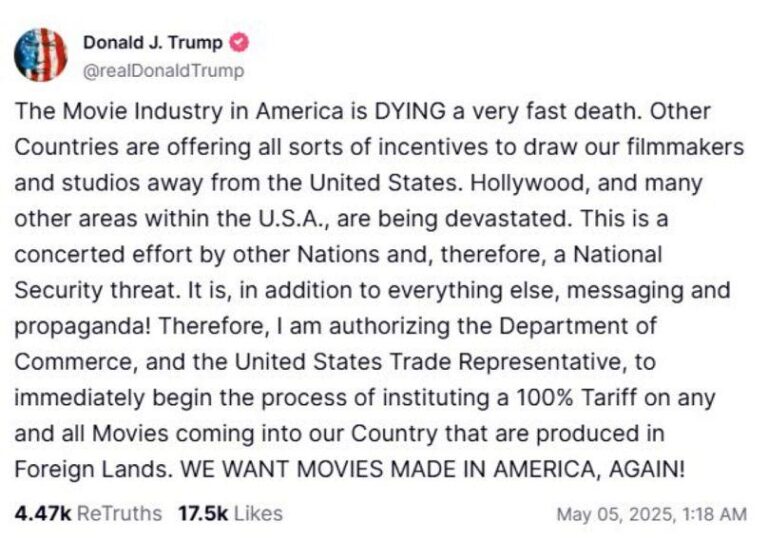In a bold move that could reshape the entertainment industry, US President Donald Trump has announced the possibility of imposing tariffs of up to 100% on foreign movies entering the American market. The controversial proposal, which comes amid ongoing trade tensions with multiple countries, has sparked concern among filmmakers and distributors alike. Industry experts warn that such levies could disrupt distribution deals, inflate ticket prices, and limit the diversity of content available to US audiences. This unexpected extension of Trump’s trade policies into the cultural sphere marks a new chapter in the administration’s approach to international commerce.
Trump Proposes 100 Percent Tariffs on Foreign Films Raising Industry Concerns
The U.S. president has recently suggested imposing 100 percent tariffs on foreign films entering the American market, a move that has sent shockwaves through the global entertainment industry. Industry experts warn that such steep levies could drastically reduce the diversity of movies available to U.S. audiences, potentially stifling creativity and international collaboration. Critics highlight concerns over the unintended consequences that might arise, including increased production costs and strained relations with key trade partners.
The proposal has sparked debate among stakeholders, who emphasize the potential impact on various facets of the industry:
- Film studios: Facing higher import expenses that could limit foreign film acquisition.
- Cinemas and streaming platforms: May need to adjust pricing or reduce foreign content offerings.
- International filmmakers: Risk losing access to one of the largest audiences worldwide.
| Stakeholder | Potential Impact | Industry Response |
|---|---|---|
| US Film Studios | Higher costs, reduced imports | Lobbying against tariffs |
| Cinemas & Platforms | Content reduction, price hikes | Seeking alternative content |
| Foreign Filmmakers | Market access restricted | Exploring niche markets |
Economic Impact of Proposed Movie Levies on International Trade and US Consumers
The proposed 100% levies on foreign movies aim to protect domestic entertainment industries but risk significant disruption in international trade dynamics. Foreign studios may be forced to increase prices or limit market access, potentially reducing the variety and volume of international films available to US consumers. This protectionist approach could provoke retaliatory measures from trade partners, leading to a ripple effect on other cultural and commercial goods. Key economic concerns include:
- Increased costs for cinemas and streaming platforms importing foreign content
- Potential inflationary pressures on entertainment prices affecting consumer spending
- Strained trade relations particularly with major movie-exporting countries
For US audiences, these levies could translate into higher ticket prices and reduced choices in global cinema offerings. Independent theaters and niche streaming services may suffer the most from reduced foreign film availability, possibly accelerating audience shifts towards domestic productions or alternative entertainment forms. Below is a simplified outlook on anticipated consumer cost impacts:
| Sector | Projected Price Increase | Impact on Variety |
|---|---|---|
| Cinema Tickets | +25-40% | Moderate Reduction |
| Streaming Services | +15-30% | Significant Reduction |
| DVD/Blu-ray Sales | +10-20% | Minor Reduction |
Hollywood and Global Studios Respond to Potential Tariff Threats
In response to recent remarks from the U.S. President suggesting a possible imposition of 100% tariffs on foreign films entering the American market, Hollywood studios and international production houses have voiced significant concerns. Industry leaders warn that such steep levies could disrupt the delicate balance of global film distribution, jeopardizing co-productions and risking severe financial losses. Major studios emphasize that these tariffs might escalate production costs, leading to higher ticket prices and diminished box office revenues worldwide.
The entertainment sector is closely analyzing potential impacts, focusing on several critical areas:
- Investment decline: Reduced cross-border investments jeopardizing upcoming projects.
- Distribution delays: Extended release schedules that could diminish audience engagement.
- Market fragmentation: Potential for segmented cinematic markets limiting cultural exchange.
| Region | Potential Impact | Estimated Loss (%) |
|---|---|---|
| North America | Box office shrinkage | 15 |
| Europe | Production funding drop | 20 |
| Asia | Distribution delays | 10 |
Policy Experts Advise on Navigating New Trade Barriers in Entertainment Sector
Policy experts are urging entertainment companies to quickly adapt strategies in response to the newly proposed tariffs that could impose a 100% levy on foreign films imported into the U.S. This unprecedented move targets movies from key international markets, potentially disrupting distribution chains and reshaping box office dynamics. Industry analysts emphasize the need for studios and distributors to diversify supply sources and consider increased domestic production to mitigate rising costs and maintain audience reach.
Advisors recommend a multi-pronged approach, highlighting crucial areas for immediate action:
- Market Analysis: Continuously monitor tariff updates and assess exposure by region and genre.
- Legal Consultation: Engage trade law experts to explore exemptions and challenge tariff applications.
- Supply Chain Review: Reevaluate contracts with foreign content providers and explore co-production opportunities.
- Consumer Impact Studies: Analyze potential changes in ticket pricing and streaming service subscriptions.
| Impact Area | Potential Outcome | Recommended Action |
|---|---|---|
| Import Costs | Up to 100% increase | Negotiate local partnerships |
| Box Office Revenues | Possible decline in foreign film attendance | Invest in domestic content |
| Distribution Networks | Disruption risk | Explore alternative digital platforms |
In Summary
As the debate over trade policies continues to intensify, President Trump’s proposal to impose tariffs of up to 100% on foreign films marks a significant escalation in his administration’s approach to protecting American industries. While supporters argue that such measures could bolster domestic production and safeguard jobs, critics warn of potential repercussions for cultural exchange and the global entertainment market. The coming weeks will be crucial in determining how these proposed levies unfold and what impact they may have on the film industry both in the United States and abroad.




